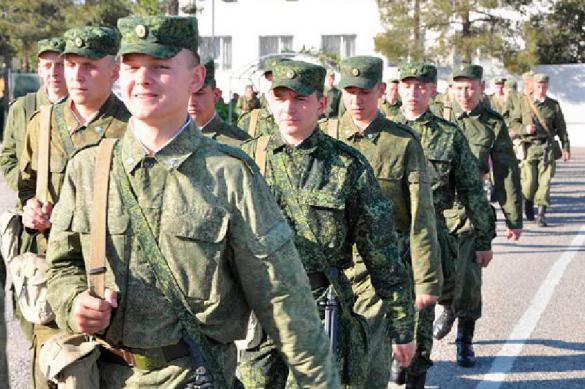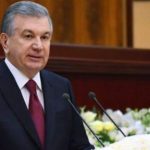Central to Russian foreign and domestic policy is the requirement of a strong army. Since at least the mid-19thcentury several Russian leaders, clerics and philosophers have espoused the notion that Moscow is the new, or third Rome (Ancient Rome/Constantinople/Moscow) and a direct descendant of the holy Roman Empire. As such, Russian cultural and political orthodoxy tied the continued existence of Mother Russia to its ability to support both a strong, masculine (preferably brutal) leader and a large, robust military. With this belief, Russia does a share a core principle with ancient Rome: the nation is only as strong as its army. However, contrary to past generations, the current generation of young Russian adults are almost universally more committed to immersing themselves in social media 24/7 (and to a lesser extent, the Internet) than in the dated notion of patriotism or military service. This generational divide has serious implications for maintaining the quality and effectiveness of the modern Russian Army. It probably already has.
With a fragile, and probably unsustainable fossil fuel based economy that has created several well-connected billionaires (modern day boyars), but continues to keep the masses at or near poverty levels (modern day serfs), the Kremlin wisely diverts the attention of the population away from thoughts about their dismal lives through fanning the flames of patriotism, at least with the older generations. This is achieved by conducting illegal invasions and annexations and through pandering to their historic paranoia of foreign invasion. These actions also serve to maintain support for increasing the military budget. So far, that strategy has for the most part, worked very well for Putin.
One of the hallmarks of Putin’s perpetual presidency has been his commitment to modernizing, rearming and professionalizing the Russian military, a process that began in earnest in 2008. Although he has devoted considerable national treasure and effort into realizing that commitment, many outside observers believe the jury is still out on a successful outcome. If recent history is any guide, Putin will continue to pour a massive amounts of rapidly dwindling resources into his quest for Russian military superiority over his Chinese and western adversaries. The overall welfare of the Russian population is of little concern in this equation.
There was never any doubt about the numerical superiority of Soviet forces over its western adversaries during the Cold War. During the 1950’s – 1980’s the world witnessed a previous version of the current modernization and expansion of the then Soviet military machine. Just as is the case with current Russian leaders, Soviet leaders viewed the creation and then expansion of NATO after the end of WWII as a direct threat to their empire’s borders and thus, to its very sovereignty. To counter that perceived existential threat, the Soviet Union embarked on a three decade numerical and technological competition with the west that stopped only when the Soviet Union collapsed in 1991. Indeed, when measured against almost any metric, the Soviet military was a formidable opponent. NATO was fortunate to never have had to find out just how formidable. But what about the readiness state of the current Russian military, specifically, the land component of the Russian military forces, the Army? Is it a superior force when measured against NATO and the west?
For the purposes of this discussion, I will not examine either the Russian or western nuclear forces since that is a topic which requires a lengthier argument than is possible here. I will also not war-game various hypothetical scenarios or analyze the opposing sides order of battle. Those are topics for a different kind of in-depth study and not the focus of this brief article.
The focus of this analysis is on an area not always given its due when discussing military readiness: conscripts. One of the most important concepts to keep in mind with any discussion about the quality of the Russian military is that the Russian Army still largely depends on conscripts, draftees, to fill out the lower ranks, primarily in the infantry. Every Russian male between 18 and 27 must register with their local military draft office (still run by a military commissar) and agree to serve one year in the Army. Despite several promises over the years by Putin to do away with conscription as a way to create a totally professional Army, the military draft still exists and shows no sign of going away anytime soon.

There are two reasons to focus on conscription in this analysis. First and foremost is that no army of conscripts fights with the same esprit de corps, passion or commitment as does an army of volunteers freely giving their allegiance (and if need be, their lives) to the cause of their nation. With rare exceptions, those qualities do not exist within the ranks of conscripts. As I, and millions of other volunteers in the U.S. military said upon the start of our military service: “I freely write a blank check to the government of the United States of America, payable, up to and including my life.” You will never hear a Russian draftee say anything similar to that at the beginning of their military service for Mother Russia.
The second reason for this focus is the nature and culture around military conscription in Russia. The feelings and opinions of young Russian men towards the draft are, if anything, even more negative than those during the latter days of Czarist Russia after 1856 when the current system of military conscription was enacted into law. During that period, young men were required to serve either six years in the Army or seven years in the navy. Today, the reigning strongman in the Kremlin still requires a steady supply of young men to maintain his resurgent military machine, albeit for a period of only one year. But the young Russian men of 2020 do not usually share Mr. Putin’s sense of duty to the Motherland. Not even close. And there are good reasons, aside from social media, for Russian men to shun service in the Army.
Although Kremlin supporters will vehemently deny there are any current problems involving hazing or serious mistreatment of Russian Army recruits, media coverage and personal testimony by soldiers and their families paint an entirely different picture. One of the most recent and horrific such cases of military abuse was in October 2019. A young Army conscript serving only a few months into his mandatory one year enlistment shot and killed eight fellow soldiers at his base in Siberia.

The Army initially blamed the incident on a disgruntled, maladjusted soldier that had trouble adapting to military life. Subsequent investigations and interviews with the soldier’s father came to a very different conclusion: long term abuse to include routine beatings, death threats and rape by fellow soldiers, all condoned by superior officers. Two officers and six soldiers were among the dead, almost certainly the perpetrators of the abuse.

In another incident, also in October of 2019, the death of a young soldier at a missile base about 190 kilometers southwest of Moscow was initially deemed a suicide. At his funeral, his mother discovered that under many layers of makeup on his face, there were numerous, serious bruises. A subsequent examination by the family doctor confirmed that the soldier had suffered many deep contusions, lacerations and broken bones, most likely the result of a severe beating. A criminal investigation is “ongoing.” There are many, many more such stories, each as sad as the these. Unfortunately, space constraints prevent me from providing any more such accounts in this article.
With rare exceptions, no Russian young man wants to serve in the armed forces, especially not the Army. A quote from a recent online journal on this topic also sheds some light on this situation: “It turns out that regular salary increases for volunteer recruits do not make military service attractive enough. The most likely underlying reason is the pervasive disrespect for the serviceman that permeates the Russian army. As a consequence, bullying remains the norm.” And this fact is well known to every Russian family, especially those with teenage sons. Bribing the local military commissar to get out of military service is still a common practice throughout Russia. No Russian mother wants her son beaten, raped or even killed while serving in the Army.



This is not the era of the Soviet Union. Young people in Russia do not, for the most part, share the same level of patriotism for the motherland as did their parents and grandparents. To the current generation of military aged men, The Great Patriotic War is a vaguely familiar term that has no real place in their daily lives and is only something they are forced to read about in school, or hear about from elderly relatives during holidays or national celebrations. They watch the Victory Day parade on TV every May because they must, not because they want to.
President Vladimir Putin is the only president they have ever known and his pronouncements imploring young Russians to loyalty for the military and patriotism for the Motherland are almost universally met with yawns, if they are heard at all. For the most part, they simply tune out Putin and all government officials. It is just not relevant for them. Russian youth are just like young people everywhere today. They spend almost all of their waking hours on social media such as VK. If they really want to find out about the news (and most don’t), they search the Internet, not TV or radio. Long gone are the days that the Kremlin had a captive audience for their domestic propaganda. For many young adults today, the Russian government, including the military, is something to avoid at all costs. They are just not interested.
What does all of this mean for the readiness of the vaunted Russian Army? It simply means the Russian Army can no longer count on its young soldiers, its draftees, to fight for their country. It means that virtually no Russian conscript is going to be writing any blank checks to their government committing their lives in service to the Motherland. It means that thousands of young, healthy, military aged Russian men are not in the Army today because of paying a bribe to a local military official to avoid military service. All this means that less qualified soldiers must fill the ranks of the otherwise qualified men who dodged the draft. It means a degradation in both the quality and motivation of young Russian Army conscripts, and therefore, a degradation of Russian Army readiness as a whole.
In dozens of personal interviews I have conducted with young Russian men over the past three years (and some of their mothers), none thought they would voluntarily give their lives to fight for their country, unless it was literally attacked by a foreign Army and they were defending their homes and families on Russian soil. Even then, many doubted they would believe their government to tell them the truth. That is a very sobering admission by so many draft age men. If that feeling is pervasive throughout the Russian Army (and I have reason to believe it is), it would confirm my initial thesis of a modern Russian Army of substantially degraded quality, not in term of weapons and equipment, but in terms of morale. This situation makes an argument for an unreliable Army, especially if forced into large scale combat with a peer military force such as NATO or the U.S. in a foreign theater of operations, far from the Motherland.
Lastly, but equally important in this analysis, is the question of the morale of the NATO military forces as it relates to their readiness and reliability, and to a much lesser extent, that of the United States. NATO (in particular, Germany) has had several well documented problems with reaching their own enlistment quotas, equipment and munitions shortages, and neo-Nazi members. Some NATO member nations even still have their own military draft systems. However, NATO represents thirty distinct, democratic nations with mostly full political participation from their citizens. That is the polar opposite of the situation in Russia. Even in the NATO countries with conscription, draftees do not worry about being beaten, raped or killed. Bribing a local draft board to escape military service is unheard of. They also receive a fair salary and other compensation. With few exceptions (Germany once again) service in the NATO military is seen as a meaningful obligation of citizenship with the young adults of NATO member countries, including women. Again, this is a real departure from the Russian cultural norm where young draft age men routinely bribe military officials to avoid military service, where women are not subject to the draft and are, for the most part, thought to be incompatible with military service.
In conclusion, I believe it is fair to say that on balance, soldiers fighting on their own soil to defend their own homes and families, and fighting voluntarily, without threats or coercion, for democratic principles in which the soldiers feel they have a large stake, will perform reliably and at a higher level than conscripts of an authoritarian regime, fighting far from home, for a government in which the soldiers feel they have no real stake and which routinely mistreats them. There are historic precedents that support this analysis of conscript armies versus highly motivated all volunteer armies going to back to Alexander the Great and even before that.
If, in the near future, NATO ever has to face the Russian Army in the European theater of operations in anything other than an utterly overwhelming conventional surprise attack or a nuclear exchange, the edge must go to NATO and its allies, especially the United States. It is inconceivable that a young Russian draftee would fight tenaciously in the forests of Germany or Latvia, for a Russian commander that had allowed that draftee to be regularly brutalized and humiliated and for a president who is if anything, a joke to him and his friends. It is entirely possible that the young conscript and several thousand of his fellow draftees would not even show up.
And the Kremlin knows this scenario is a very real possibility. That knowledge is one of the most important keys to NATO security in the near term, but it will not remain this way for long. I sincerely hope NATO uses this short window of time to get its act together and fund their military forces to the proper levels needed to combat the resurgent Russian military that is sure to emerge in the not too distant future.
They won’t get a second chance.
Author
-

Retired U.S. Army Counterintelligence Special Agent. He served in Iraq as a team leader of a tactical Human Intelligence Team (THT). Prior to his deployment to Iraq, David was an instructor at the reserve U.S. Army Counterintelligence Special Agent course. He has published four novels for Grand Central Publishing and is currently finishing a memoir of his experience in Iraq. David has also written articles for Vanity Fair, Salon.com, The American Prospect and The Washington Monthly.
View all posts




